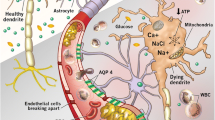Abstract
Brain damage and heart failure may coexist if terminal heart failure or arrhythmias induce cerebral hypoperfusion. Another frequent situation of heart failure-induced brain damage is represented by cardiac arrest, which remains a major public health problem and a leading cause of death. Cardiac arrest either occurs during the course of a known cardiopathy or suddenly reveals an unknown underlying cardiac disease. Following refractory shock or multiorgan failure, and after experiencing cardiac arrest, irreversible brain damages remain the major cause of death. Thus, several therapies are commonly used to reduce brain injuries, including hypothermia, which remains to date the most convincing treatment for brain protection.
Access this chapter
Tax calculation will be finalised at checkout
Purchases are for personal use only
Preview
Unable to display preview. Download preview PDF.
Similar content being viewed by others
References
Safar P. Resuscitation of the ischemic brain. In: Albin MS, ed. Textbook of Neuroanesthesia with Neurosurgical and Neuroscience Perspectives. New York: McGraw-Hill, 1997:557–93.
Safar P, Behringer W. Brain resuscitation after cardiac arrest. In: Layon AJ, Gabrielli A, Friedman WA, eds. Textbook of Neurointensive Care. Philadelphia: WB Saunders, 2003:457–98.
Polderman K. Application of therapeutic hypothermia in the intensive care unit. Opportunities and pitfalls of a promising treatment modality. Part 1: indications and evidence. Intensive Care Med. 2004;30:556–75.
Safar P. Resuscitation from clinical death: pathophysiologic limits and therapeutic potentials. Crit Care Med. 1988;16:923–41.
Polderman K. Application of therapeutic hypothermia in the intensive care unit. Opportunities and pitfalls of a promising treatment modality. Part 2: practical aspects and side effects. Intensive Care Med. 2004;30:757–9.
Sterz F, Behringer W, Holzer M. Global hypothermia for neuroprotection after cardiac arrest. Acute Cardiac Care. 2006;8:25–30.
Bernard SA, Jones BM, Horne MK. Clinical trial of induced hypothermia in comatose survivors of out-of hospital cardiac arrest. Ann Emerg Med. 1997;30:146–53.
Yanagawa Y, Ishihara S, Norio H, et al. Preliminary clinical outcome study of mild resuscitative hypothermia after out-of hospital cardiopulmonary arrest. Resuscitation. 1998;39:61–6.
Zeiner A, Holzer M, Sterz F, et al. Mild resuscitative hypothermia to improve neurological outcome after cardiac arrest. A clinical feasibility trial. Hypothermia After Cardiac Arrest (HACA) Study Group. Stroke. 2000;31:86–94.
Hachimi-Idrissi S, Corne L, Ebinger G, et al. Mild hypothermia induced by a helmet device: a clinical feasibility study. Resuscitation. 2001;35:275–81.
Bernard SA, Gray TW, Buist MD, et al. Treatment of comatose survivors of out-of-hospital cardiac arrest with induced hypothermia. N Engl J Med. 2002;346:557–63.
The Hypothermia After Cardiac Arrest Group. Mild therapeutic hypothermia to improve the neurologic outcome after cardiac arrest. N Engl J Med. 2002;346:549–56.
Holzer M, Bernard SA, Hachimi-Idrissi S, et al. Hypothermia for neuroprotection after cardiac arrest: systematic review and individual patient data meta-analysis. Crit Care Med. 2005;33:414–8.
2005 American Heart Association Guidelines for Cardiopulmonary Resuscitation and Emergency Cardiovascular Care of Pediatric and Neonatal Patients: Neonatal Resuscitation Guidelines. American Heart Association, American Academy of Pediatrics. Pediatrics. 2006;117;1029–38.
International Liaison Committee On resuscitation, European Resuscitation Council and American Heart Association. Part 4: Advanced Life Support. Resuscitation. 2005;67:213–47.
Nolan JP, Morley PT, Vanden Hoek TL, Hickey RW. Therapeutic hypothermia after cardiac arrest. An advisory statement by the Advancement Life Support Task Force of the International Liaison Committee On Resuscitation. Circulation. 2003;108:118–21.
Mattu A, Brady WJ, Perron AD. Electrocardiographic manifestations of hypothermia. Ann J Emerg Med. 2002;20:314–26.
Kloner RA, Rezkalla SH. Cardiac protection during acute myocardial infarction: where do we stand in 2004? J Am Coll Cardiol. 2004;44:276–86.
Kandzari DE, Chu A, Brodie BR, et al. Feasibility of endovascular cooling as an adjunct to primary percutaneous coronary intervention (results of the LOWTEMP pilot study). Am J Cardiol. 2004;93:636–9.
Ly HQ, Denault A, Dupuis J, et al. A pilot study: The noninvasive surface cooling thermoregulatory system for mild hypothermia induction in acute myocardial infarction (The NICAMI study). Am Heart J. 2005;150:933.e9-13.
Ali MS, Harmer M, Kirkham F. Cardiopulmonary bypass temperature and brain function. Anaethesia. 2005;60:365–72.
Guidelines for the management of severe head injury. Brain Trauma Foundation, American Association of Neurological Surgeons, Joint Section on Neurotrauma and Critical Care. J Neurotrauma. 1996;13:641–734.
The Brain Trauma Foundation: The American Association of Neurological Surgeons, The Joint Section on Neurotrauma and Critical Care. Resuscitation of blood pressure and oxygenation. J Neurotrauma. 2000;17:641–734.
Schweickert WD, Gehlbach BK, Pohlman AS, Hall JB, Kress JP. Daily interruption of sedative infusions and complications of critical illness in mechanically ventilated patients. Critical Care Med. 2004;32:1272–6.
Van den Berghe G, Wilmer A, Hermans G, et al. Intensive Insulin therapy in the medical ICU. N Engl J Med. 2006;354:449–61.
The CREATE-ECLA trial Group Investigators. Effect of Glucose-Insulin-Potassium infusion on mortality in patients with acute myocardial infarction. The CREATE-ECLA randomized controlled trial. JAMA. 2005;293:437–46.
Author information
Authors and Affiliations
Editor information
Editors and Affiliations
Rights and permissions
Copyright information
© 2008 Springer-Verlag London Limited
About this chapter
Cite this chapter
Deye, N., Mégarbane, B., Baud, F.J. (2008). Acute Heart Failure Treatment and Brain Protection. In: Mebazaa, A., Gheorghiade, M., Zannad, F.M., Parrillo, J.E. (eds) Acute Heart Failure. Springer, London. https://doi.org/10.1007/978-1-84628-782-4_63
Download citation
DOI: https://doi.org/10.1007/978-1-84628-782-4_63
Publisher Name: Springer, London
Print ISBN: 978-1-84628-781-7
Online ISBN: 978-1-84628-782-4
eBook Packages: MedicineMedicine (R0)




